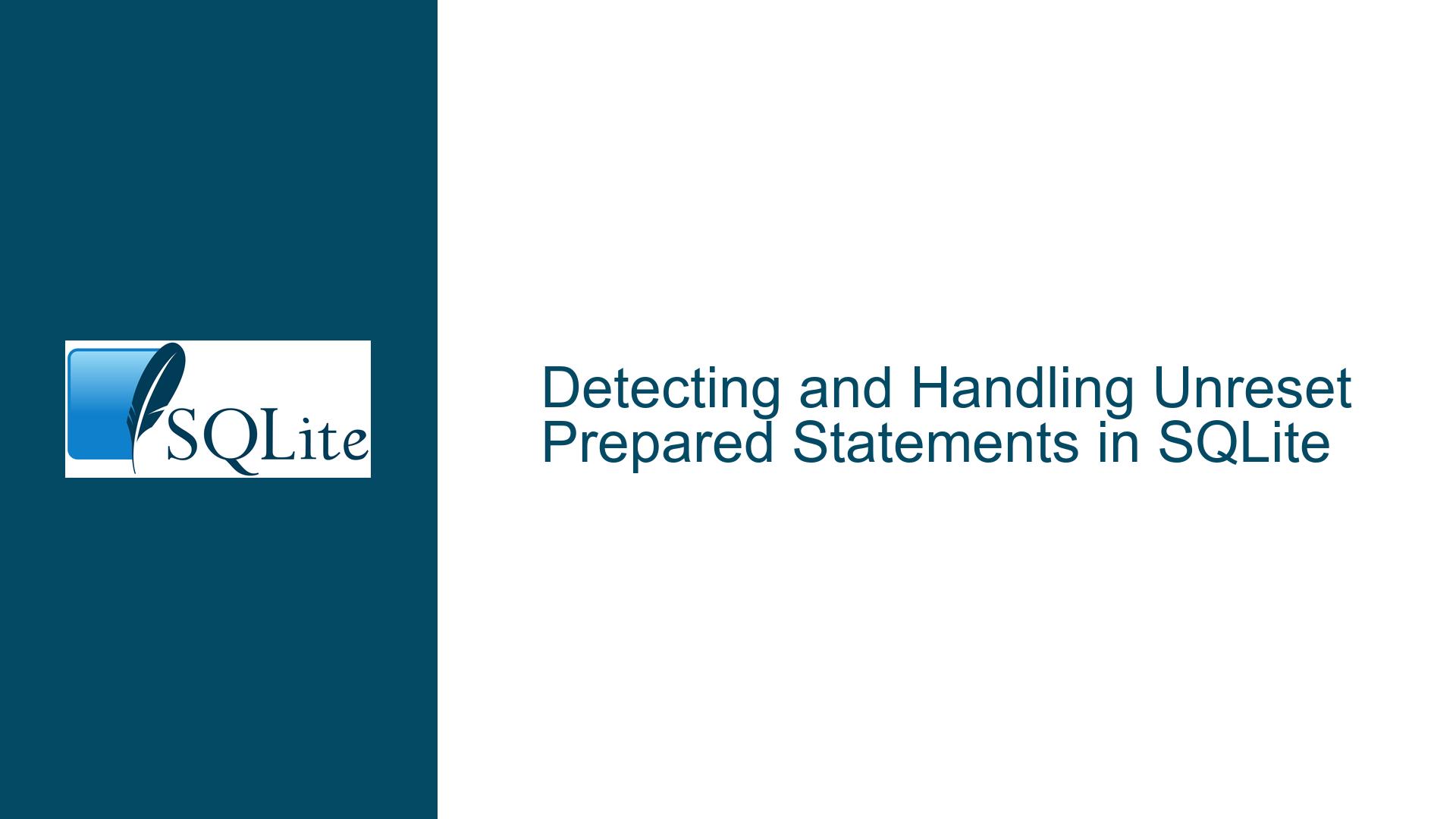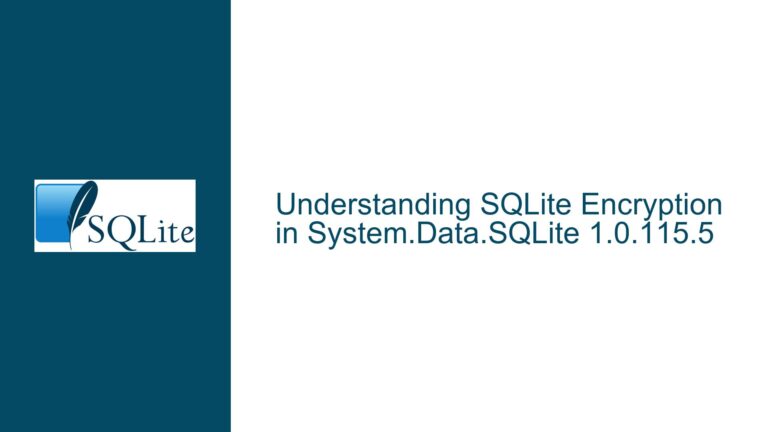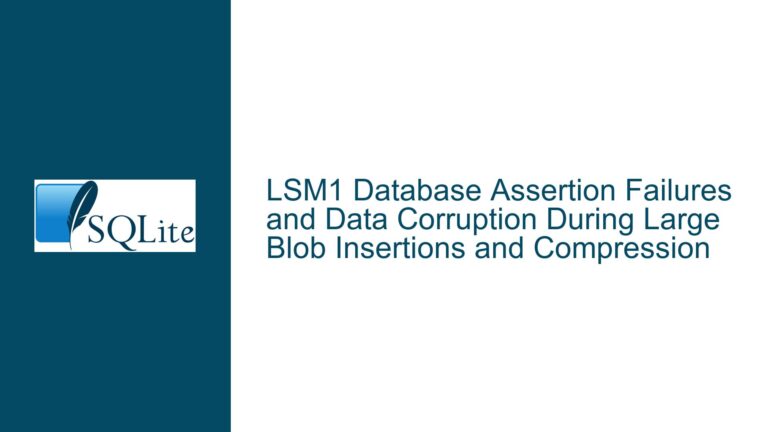Detecting and Handling Unreset Prepared Statements in SQLite
Issue Overview: Unreset Prepared Statements Causing Stale Bindings
When working with SQLite’s prepared statements, developers may encounter scenarios where reusing a prepared statement without proper reset leads to unexpected behavior with bound parameters. This occurs when a statement reaches completion (returns SQLITE_DONE) but retains previous binding values, causing subsequent executions to use stale data rather than newly bound values. The core challenge lies in detecting whether a prepared statement requires resetting before reuse, given that SQLite’s API doesn’t provide explicit feedback about binding readiness through standard status checks like sqlite3_stmt_busy().
Prepared statements progress through distinct lifecycle phases: preparation, binding, execution, and reset. After reaching SQLITE_DONE during execution, the statement remains in a "completed but unreset" state where parameter bindings persist until either reset or rebound. This creates hidden pitfalls when developers assume SQLITE_DONE implies readiness for new bindings without explicit reset. The absence of immediate errors compounds the problem, as SQLite permits binding attempts on unreset statements but silently ignores them unless developers explicitly check return codes from binding functions.
Possible Causes: State Mismanagement and Error Handling Gaps
Three primary factors contribute to unreset prepared statement issues:
1. Incomplete Statement Lifecycle Management
SQLite prepared statements require explicit resetting via sqlite3_reset() before subsequent uses to clear both execution state and parameter bindings. Developers accustomed to auto-resetting database drivers may incorrectly assume SQLITE_DONE indicates full completion, neglecting to reset statements. The API permits binding new values to unreset statements but returns SQLITE_MISUSE if attempted before finalizing execution (e.g., during mid-execution), creating inconsistent behavior across different usage patterns.
2. Unchecked Binding Operation Return Codes
The sqlite3_bind_* family of functions return status codes indicating success or failure. Binding to an unreset statement after completion (SQLITE_DONE) technically succeeds but overwrites previous parameters only if the statement was properly reset. If the statement hasn’t been reset, binding attempts fail with SQLITE_MISUSE, but developers often ignore these return values, leading to silent persistence of old values. This creates a false perception that bindings "stick" between executions when in reality new bindings never take effect.
3. Misinterpretation of Statement Busy Status
The sqlite3_stmt_busy() function reports whether a statement is actively yielding rows (e.g., mid-SELECT execution), not whether it requires resetting. A statement that has returned SQLITE_DONE but hasn’t been reset shows as non-busy, misleading developers into thinking it’s ready for reuse. This API behavior creates a gap where statements appear available but retain old bindings, requiring additional state tracking beyond what’s provided natively.
Troubleshooting Steps, Solutions & Fixes
1. Enforce Strict Error Checking Protocol
Every SQLite API call must have its return code validated, especially binding operations. Modify code to:
int bind_res = sqlite3_bind_int(ins, 1, 2);
if (bind_res != SQLITE_OK) {
fprintf(stderr, "Bind failed: %s\n", sqlite3_errstr(bind_res));
// Handle error: reset statement or finalize
}
Implement wrapper functions that enforce error checking, reducing boilerplate. For critical applications, consider aborting execution on unhandled errors to prevent silent failures.
2. Implement State Tracking for Prepared Statements
Create a state machine tracking each statement’s lifecycle phase:
typedef enum {
STMT_PREPARED,
STMT_BOUND,
STMT_EXECUTING,
STMT_NEEDS_RESET,
STMT_FINALIZED
} StmtState;
typedef struct {
sqlite3_stmt* stmt;
StmtState state;
} ManagedStmt;
void execute_stmt(ManagedStmt* mstmt) {
if (mstmt->state == STMT_NEEDS_RESET) {
sqlite3_reset(mstmt->stmt);
mstmt->state = STMT_PREPARED;
}
// ... execute and update state ...
}
This approach eliminates ambiguity about when resets are required. Combine with RAII patterns in C++ or smart pointers in C to automate state transitions.
3. Adopt Reset-Before-Bind Discipline
Modify code to always reset statements before binding new parameters, regardless of prior execution state:
sqlite3_reset(ins); // Safe even if already reset
sqlite3_clear_bindings(ins); // Optional: clear previous binds
int bind_res = sqlite3_bind_int(ins, 1, 2);
While sqlite3_reset() isn’t strictly required before rebinding if the statement is already in reset state, making it a mandatory practice prevents stale binding issues. For performance-critical code, track reset state to avoid redundant calls.
4. Utilize SQLITE_MISUSE Detection
When binding to an unreset statement, SQLite returns SQLITE_MISUSE if the statement is in an invalid state for binding. Handle this explicitly:
int bind_res = sqlite3_bind_int(ins, 1, 2);
if (bind_res == SQLITE_MISUSE) {
sqlite3_reset(ins);
bind_res = sqlite3_bind_int(ins, 1, 2); // Retry after reset
}
if (bind_res != SQLITE_OK) {
// Handle persistent error
}
Note that SQLITE_MISUSE can also indicate other API contract violations, so combine this with general error handling rather than relying solely on it for reset detection.
5. Employ Prepared Statement Wrappers
Create abstraction layers that manage statement lifecycle automatically:
typedef struct {
sqlite3_stmt* stmt;
bool needs_reset;
} AutoStmt;
void auto_stmt_bind_int(AutoStmt* astmt, int pos, int val) {
if (astmt->needs_reset) {
sqlite3_reset(astmt->stmt);
astmt->needs_reset = false;
}
sqlite3_bind_int(astmt->stmt, pos, val);
}
int auto_stmt_step(AutoStmt* astmt) {
int res = sqlite3_step(astmt->stmt);
if (res == SQLITE_DONE || res == SQLITE_ROW) {
astmt->needs_reset = true;
}
return res;
}
This wrapper automatically tracks reset state, reducing developer cognitive load. Extend with logging, metrics, or custom memory management as needed.
6. Leverage SQLite3 Extended Result Codes
Enable extended error codes during database initialization for more granular diagnostics:
sqlite3_open_v2(":memory:", &db, SQLITE_OPEN_READWRITE, NULL);
sqlite3_extended_result_codes(db, 1);
Extended codes provide detailed error context, helping distinguish between binding failures due to unreset statements vs other issues like type mismatches or invalid parameter indices.
7. Implement Unit Test Sanity Checks
Develop test cases that validate statement reset behavior:
void test_stmt_reuse() {
// ... setup ...
sqlite3_bind_int(ins, 1, 42);
sqlite3_step(ins);
assert(sqlite3_bind_int(ins, 1, 24) == SQLITE_MISUSE);
sqlite3_reset(ins);
assert(sqlite3_bind_int(ins, 1, 24) == SQLITE_OK);
// ... teardown ...
}
Automated tests catch regressions in statement handling logic, especially when modifying low-level database code.
8. Analyze Statement Status Using sqlite3_stmt_status()
While not directly revealing reset state, this function helps profile statement behavior:
int vm_steps = sqlite3_stmt_status(stmt, SQLITE_STMTSTATUS_VM_STEP, 0);
if (vm_steps > 0) {
// Statement has been executed but may need reset
}
Combine with custom tracking to infer when resets should occur. Note this is heuristic rather than authoritative.
9. Adopt Connection-Wide Statement Management
Maintain a registry of all prepared statements per database connection, tracking their states:
typedef struct {
sqlite3* db;
HashMap statements; // Maps SQL strings to ManagedStmt objects
} DBConnection;
void db_bind_int(DBConnection* conn, const char* sql, int pos, int val) {
ManagedStmt* mstmt = hashmap_get(&conn->statements, sql);
if (mstmt->state == STMT_NEEDS_RESET) {
sqlite3_reset(mstmt->stmt);
mstmt->state = STMT_PREPARED;
}
sqlite3_bind_int(mstmt->stmt, pos, val);
}
Centralized management prevents individual statement state inconsistencies and enables features like automatic statement finalization on connection close.
10. Utilize Static Analysis and Linting
Implement build-time checks using tools like Clang static analyzer or custom SQLite-specific linters to detect:
- Missing sqlite3_reset() after SQLITE_DONE
- Unchecked return values from sqlite3_bind_* calls
- Use of sqlite3_stmt after finalization
Integrate these checks into CI/CD pipelines to enforce proper statement handling discipline across development teams.
By systematically applying these strategies, developers eliminate undetected stale binding scenarios while improving overall code robustness. The key realization is that SQLite’s prepared statements require explicit state management beyond simple step/reset cycles, particularly when rebinding parameters across multiple executions. Combining rigorous error checking with architectural patterns that encapsulate statement lifecycle management prevents entire classes of subtle database interaction bugs.






